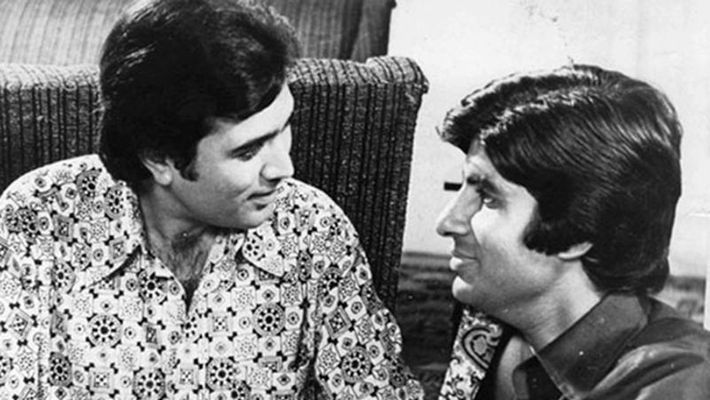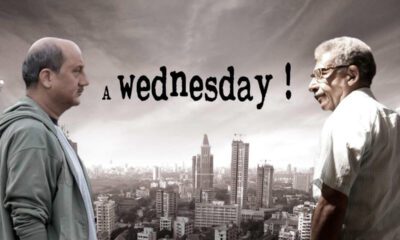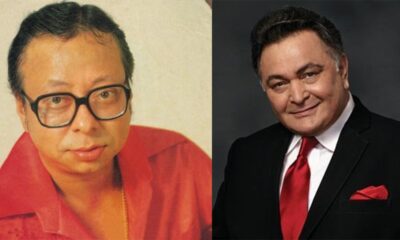Bollywood News
When Both Rajesh Khanna & Amitabh Bachchan Wanted To Die

Only Hrishikesh Mukherjee could dare to bring the reigning superstar Rajesh Khanna and the upcoming Amitabh Bachchan in Anand in 1971. Four years later when Hrishida cast them again together in Namak Haraam he was advised to retrace his steps before it was too late. Because by then the Bachchan had already dethroned the Khanna and the latter didn’t feel too good about it.
But Hrishida was adamant. He was sure his two protégées would behave themselves. Sure enough things went smoothly during the shooting until it came to the climax. The question that cropped up was, who among the two stars was going to die at the end? Khanna who suffered from a death wish on screen , felt the ‘privilege’ was rightfully his. On the other hand the Bachchan felt his character’s death made more sense in the plot.
So what did Hrishida do? He sorted the problem by withholding the information on the death scene from the actors. He didn’t reveal who was going to die to either of the two stars until the day when the death sequence was to be shot. On that day he announced the ‘privilege’ by putting a garlanded photograph of the chosen one on the set in the morning before shooting.
For the record , the one chosen for the privilege was Rajesh Khanna.
Rajesh Khanna repeatedly played characters who went bravely and defiantly to their death.In another of his celebrated roles in Safar , he sang in his playback Kishore Kumar’s voice, Zindagi se bahot pyar humnein kiya maut se be bhi mohabbat nibhayenge hum/Rote-rote zamanein mein aaye magar hanste hanste zamanein se jayenge hum…
Rajesh Khanna’s love affair with death began in his career-making film Aradhana when the airforce pilot Arun perishes leaving behind his pregnant girlfriend to face stigma and ostracizing. Khanna romanced the most beautiful women on screen but went to bed with death.
After Aradhana he made a career out of playing doomed characters.A year later in Asit Sen’s underrated masterpiece Safar played an artiste dying of cancer.This was the second fim that proved how comfortable the actor was doing death scenes.He virtually relished the moments when his character gasped his last. During the same year as Safar he again smiled his way through cancer into death in Anand, immortalizing his career by taking on death headlong
After the trilogy of great tragic roles Rajesh Khanna did the spectacularly successful guest appearance in Ramesh Sippy’s Andaz where he dies singing Zindagi ek safar hai suhana yahan kal kya ho kissne jaana.
In the 1974 marital drama Aap Ki Kasam an entire mythology of mortality is woven around the song Zindai ke safar mein guzar jaate hain jo maqaam woh phir nahin aate. The penitent husband travels from place to place seeking atonement for his mistaken belief that his wife was unfaithful. He dies at his daughter’s wedding venue.The entire episode echoed Ashok Kumar’s journey and death in Hrishikesh Mukherjee’s Aashirwad.
With the help of directors from the Bimal Roy school of filmmaking like Hrishikesh Mukherjee, Asit Sen, Shakti Samanta and Raj Khosla, Rajesh Khanna repeatedly created the persona of the tragically doomed hero.A post-modernist Devdas.
In 1974’s blockbuster Roti Khanna is gunned down at the Indo-Pak border as tries to cross with his girlfriend Mumtaz. By this point in his career Khanna was unnecessarily imposing mortality on his characters.In several of his post-superstardom films like Prem Nagar, Amar Deep, Avatar, and Dard we can see Rajesh Khanna strugging to bring his characters to a tragic closure merely out of habit.He had forgotten Anand’s philosophy. Zindagi badi honi chahiye lambi nahin.The same goes for mortality. The death wish cannot be used as an extended tool for artistic impact .








